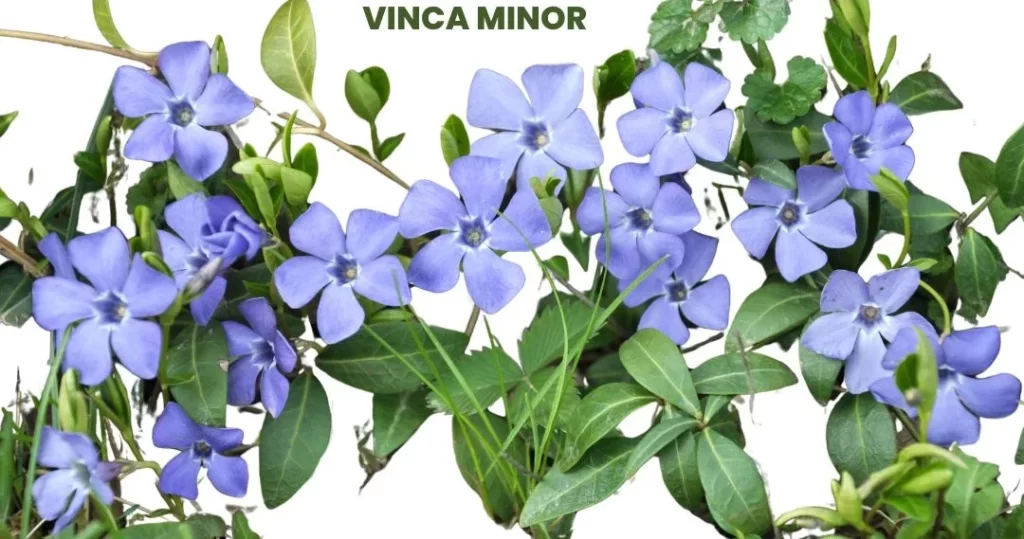Vinca Minor, commonly known as Lesser Periwinkle, is a perennial flowering plant belonging to the Apocynaceae family.
In homeopathy, it is renowned for its therapeutic properties in treating skin conditions, particularly eczema and plica polonica, as well as managing various hemorrhagic conditions and throat infections like diphtheria.
The remedy draws from the plant’s whole fresh herb and has been used in traditional medicine for centuries.

Table of Contents
ToggleSOURCE INFORMATION
Scientific Classification
- Kingdom: Plantae
- Phylum: Angiosperms
- Class: Eudicots
- Order: Gentianales
- Family: Apocynaceae
- Genus: Vinca
- Species: V. minor
Origin and Historical Facts
- Vinca minor is native to Europe and parts of Asia but has been introduced to North America and other regions.
- Historically, it has been used in folk medicine for its supposed ability to stop bleeding and treat various ailments.
- The plant’s alkaloids, particularly vincamine, have been studied for their effects on circulation and are thought to have a role in the remedy’s efficacy.
- Homeopathic use began in the 19th century, aligning with the principles of using highly diluted substances to treat ailments.
DRUG PATHOGENESIS
- The pathogenesis of Vinca minor is linked to its effects on the skin and mucous membranes.
- The remedy primarily addresses issues related to excessive moisture, irritability of the skin, and systemic symptoms such as hemorrhages.
- The plant’s alkaloids may contribute to its action on blood vessels, influencing conditions associated with bleeding and circulatory dysfunction.
PHYSICAL CONSTITUTION
- Individuals who may benefit from Vinca minor often present with sensitive skin and a propensity for conditions exacerbated by humidity or moisture.
- They may experience emotional disturbances linked to physical ailments, particularly concerning bleeding or skin irritations.
WHAT IS CONSTITUTION IN HOMOEOPATHY?
DIATHESIS AND TEMPERAMENTS
- The remedy is suitable for individuals with a lymphatic diathesis, characterized by a predisposition to conditions affecting the lymphatic system, such as swelling and infections.
- The temperament can be described as sanguine, marked by lively and energetic dispositions, but prone to mood swings and irritability.
WHAT IS DIATHESIS IN HOMOEOPATHY?
WHAT ARE TEMPERAMENTS IN HOMOEOPATHY?
KEY CHARACTERISTICS
- Strong efficacy for skin afflictions and hemorrhagic conditions
- Corrosive itching and significant sensitivity of the skin
- Symptoms often aggravated by moisture and slight physical contact
DETAILED ORGAN SYMPTOMS
HEAD
- Tearing Pain: Severe pain localized in the vertex of the head, often accompanied by a sensation of pressure.
- Auditory Symptoms: Ringing and whistling sounds in the ears, potentially indicating disturbances in the auditory system.
- Vertigo: Whirling sensations, sometimes accompanied by visual disturbances, such as flickering lights or spots before the eyes.
- Scalp Conditions: The presence of oozing moisture on the scalp, causing hair matting and bald spots. The scalp may exhibit corrosive itching and the urge to scratch.
NOSE
- Erythema of the Tip: The tip of the nose becomes easily red and irritated.
- Eruptions: Moist eruptions on the septum and seborrheic conditions affecting the upper lip and base of the nose.
- Nasal Obstruction: One nostril may become blocked, causing discomfort and difficulty breathing.
THROAT
- Difficult Swallowing: A sensation of constriction in the throat leading to painful swallowing.
- Ulcerations: Presence of ulcers, potentially indicating severe inflammation.
- Diphtheria Symptoms: Frequent hawking and general throat discomfort associated with diphtheritic conditions.
FEMALE REPRODUCTIVE SYSTEM
- Menorrhagia: Excessive menstruation resulting in significant weakness and fatigue, particularly prevalent during the climacteric phase.
- Uterine Hemorrhages: Passive bleeding from the uterus, sometimes linked to the presence of fibroids.
SKIN
- Corrosive Itching: Intense itching sensations with extreme sensitivity, leading to redness and soreness from minimal friction.
- Eczema: Chronic skin condition characterized by pustules, burning sensations, and an offensive odour, particularly affecting the head and face. Hair may mat together due to oozing.
MODALITIES
- Worse: Symptoms typically worsen in humid conditions or when the skin is touched or rubbed.
- Better: Improvement may occur in dry conditions or with the application of soothing treatments.
WHAT ARE MODALITIES IN HOMOEOPATHY?
RELATIONSHIP WITH OTHER DRUGS
- Compare: The remedy can be compared with Oleander (for skin conditions) and Staphysagria (for skin afflictions with a psychological component).
- Antidote: Camphor is sometimes used as an antidote for adverse reactions.
- Complementary: It may work synergistically with other remedies used for hemorrhagic conditions.
DOSE
- Vinca minor is typically administered in potencies ranging from first to third potency, depending on the severity of symptoms and the individual’s response.
Frequently Asked Questions
What conditions can Vinca minor treat?
- It is effective for skin ailments, especially eczema, bleeding disorders, and throat infections like diphtheria.
How is it administered?
- The remedy is usually provided in liquid form, diluted according to homeopathic principles.
Can it be used with other medications?
- It is advisable to consult with a homeopathic practitioner for compatibility with other treatments.
How long does it take to notice improvements?
- The time for relief can vary based on individual responses and the specific condition being treated.
Meaning of Difficult Words
- Plica Polonica: A condition characterized by matting of the hair due to a moist scalp condition.
- Eczema: A group of conditions that cause the skin to become inflamed or irritated.
- Menorrhagia: Excessive menstrual bleeding.
- Hemorrhage: Excessive or profuse bleeding.
- Seborrhoea: A skin condition that causes scaly patches and red skin, often on the scalp.
- Diphtheria: A serious bacterial infection affecting the mucous membranes of the throat and nose.
- Hawking: The act of clearing the throat or attempting to expel mucus.
- Ulcer: A sore that develops on the skin or mucous membranes.
- Corrosive: Having the ability to cause damage to skin or tissue, often leading to irritation or ulceration.
This detailed overview of Vinca Minor in homeopathy emphasizes its therapeutic roles and characteristics, providing a comprehensive understanding of its applications in treating various ailments.
